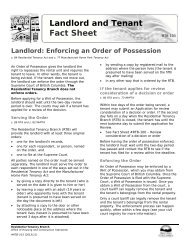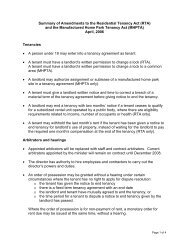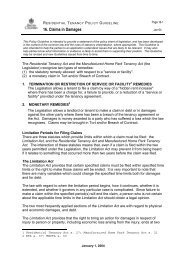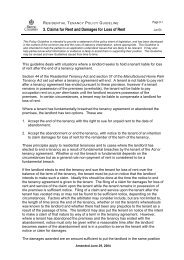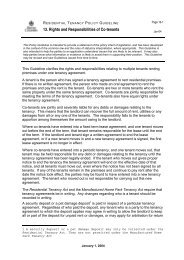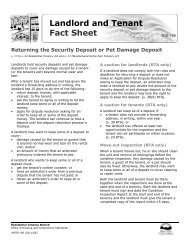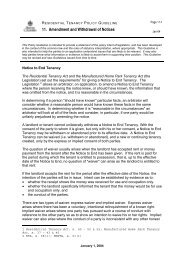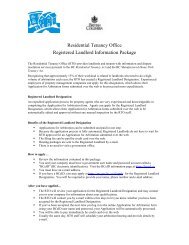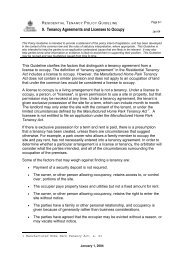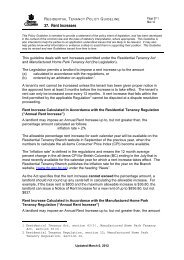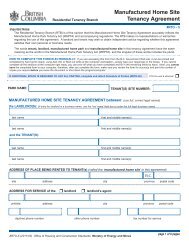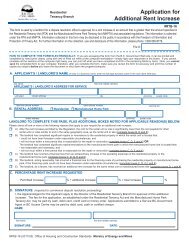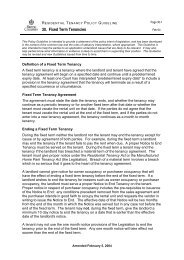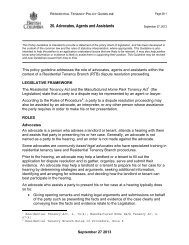Fact Sheet RTB-113 - Residential Tenancy Office
Fact Sheet RTB-113 - Residential Tenancy Office
Fact Sheet RTB-113 - Residential Tenancy Office
Create successful ePaper yourself
Turn your PDF publications into a flip-book with our unique Google optimized e-Paper software.
Protecting Against Illegal Activity on a Rental Property Page 2 of 3<br />
Issue warning letters for breaches of the<br />
tenancy agreement<br />
The landlord can issue a warning letter informing<br />
the tenant of a breach of agreement, giving a<br />
reasonable period for the tenant to comply, and<br />
notifying the tenant that a failure to correct the<br />
breach will result in the tenancy ending. If the<br />
tenant breaches the agreement for the same<br />
reason again, the landlord can serve a One-<br />
Month Notice to End <strong>Tenancy</strong>.<br />
Landlord giving notice to end the tenancy<br />
(s. 47 RTA and s. 40 MHPTA)<br />
The landlord can serve the tenant with a One-<br />
Month Notice to End <strong>Tenancy</strong> where the tenants<br />
or their guests have:<br />
engaged in illegal activity that has caused or<br />
is likely to cause damage to the landlord’s<br />
property.<br />
adversely affected or is likely to adversely<br />
affect the quiet, enjoyment, security, safety<br />
or physical well-being of another occupant of<br />
the residential property.<br />
engaged in illegal activity that has<br />
jeopardized or is likely to jeopardize a lawful<br />
right or interest of another occupant, or the<br />
landlord.<br />
significantly interfered with or unreasonably<br />
disturbed another occupant or the landlord.<br />
seriously jeopardized the health or safety or a<br />
lawful right or interest of the landlord or<br />
another occupant.<br />
<br />
<br />
<br />
put the landlord’s property at significant risk.<br />
caused extraordinary damage to a rental unit,<br />
residential property, manufactured home site,<br />
or manufactured home park.<br />
damaged the rental unit to an extent that<br />
exceeds reasonable wear and tear, and the<br />
tenant has failed to take necessary steps to<br />
repair the damage within a reasonable period.<br />
A landlord can serve one-month’s notice for more<br />
than one reason, if appropriate.<br />
When determining whether a tenant’s activities<br />
are serious enough to terminate the tenancy, the<br />
landlord needs to consider the extent of the<br />
interference with the quiet enjoyment of tenants,<br />
extent of damage to the property, and the<br />
jeopardy related to the activity and the risk<br />
placed on the landlord and other occupants.<br />
For instance:<br />
illegal rewiring or unprofessional installation<br />
of excessive lighting can result in a significant<br />
fire hazard and be grounds for serving notice<br />
due to a serious impairment of the landlord’s<br />
lawful right or interest.<br />
smoking a marijuana cigarette is illegal but<br />
unless the landlord can prove there is a<br />
significant impact on other occupants or the<br />
landlord’s property, there may not be<br />
sufficient grounds to end the tenancy.<br />
growing one or two marijuana plants<br />
exclusively for personal use is illegal and<br />
might form the basis for ending the tenancy if<br />
it would jeopardize the landlord’s ability to<br />
insure the property.<br />
not paying the rent contravenes the RTA but<br />
is not illegal. However, if a tenant gets in the<br />
way of a landlord collecting rent from other<br />
tenants, this could be illegal harassment and<br />
grounds for ending the tenancy.<br />
where a tenant commits a serious crime such<br />
as robbery or physical assault somewhere<br />
else than not on the rental property, there is<br />
likely not sufficient evidence to serve notice.<br />
However, if the tenant assaults the landlord,<br />
or robs from other tenants, this could be a<br />
reason enough to end the tenancy.<br />
A tenant who believes that ending the tenancy is<br />
not justified can apply for dispute resolution<br />
asking for an order setting aside the notice. The<br />
tenant must submit this application within 10<br />
days of receiving the Notice to End <strong>Tenancy</strong>. If<br />
the tenant does not dispute the notice, the<br />
tenant is presumed to accept that the tenancy<br />
will end on the date specified in the notice and<br />
must move out.<br />
At the dispute resolution hearing, the landlord<br />
must provide solid and convincing evidence that<br />
justifies eviction of the tenant, including:<br />
showing how the circumstances fall within the<br />
reasons given for ending the tenancy; and<br />
evidence demonstrating the allegations are<br />
true. Allegations, unsupported by evidence,<br />
are not sufficient. The landlord must prove<br />
that it is more likely than not that what is<br />
alleged in the Notice to End <strong>Tenancy</strong> is true.<br />
See <strong>Fact</strong> <strong>Sheet</strong> <strong>RTB</strong>-127 “Preparing for Dispute<br />
Resolution: gathering evidence”.



